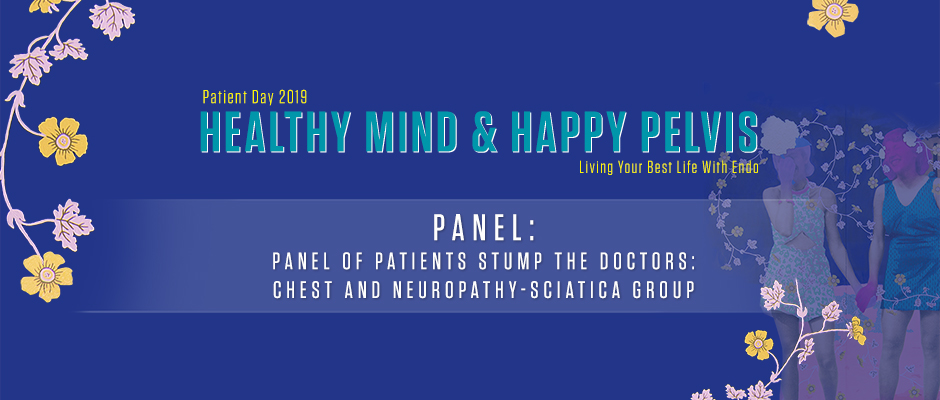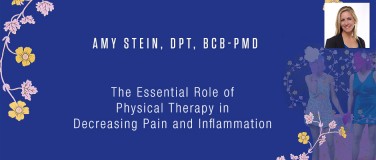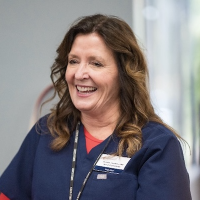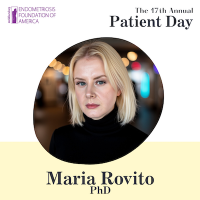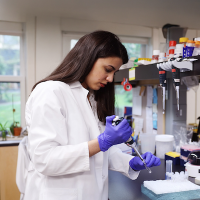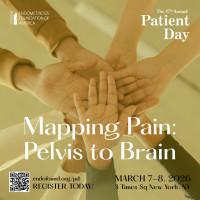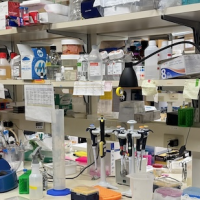Panel of Patients Stump the Doctors: Chest and Neuropathy-Sciatica Group
Patient Awareness Day 2019: HEALTHY MIND & HAPPY PELVIS
Living Your Best Life With Endo
March 10, 2019 (8am - 5pm)
Einhorn Auditorium, Lenox Hill Hospital, New York City
https://www.endofound.org/patientday/2019
Good Afternoon. My name is Latia. I will be 39 in the end of March and I am a stage four endometriosis patient that was diagnosed February of 2017 after 23 years of symptoms. Yes, so it took a long time and I honestly believe that if I didn't have the lung collapses I probably still would be dealing with endometriosis.
I woke up one day, felt a little chest tightness, something told me to go to RG Care Center. She thought I had some bronchospasms. Gave me a couple of meds. Didn't work. Then I told her I felt something was like sitting on my chest, so she sent me to a radiology center to get a CAT scan to rule out a pulmonary embolism. It actually was a right lung collapse with pneumonia.
Off to the ER I went. Had to have a chest tube placed in. I was on the second day of my period and I really didn't tell anyone. I didn't think anything of it and it's quite interesting that the attending did say that you don't fit the typical description of someone with a spontaneous pneumothorax. But, she didn't dig a little deeper into it. I also have blebs on my lungs, which are little air pocket cysts, so they said I had a spontaneous pneumothorax due to a rupture of a cyst.
I ended up staying in the hospital for nine days. Had to have a surgery, a lung resection, and a pleurodesis, which is a little procedure so that your lung adheres to the chest wall cavity preventing further collapses. So, I was told I would have a 10% chance of my lung collapsing again.
Since then, I still had a lot of difficulty breathing and chest pains and lots of testing and was diagnosed with asthma, which I didn't believe. Then about two years later, again, I woke up- my lung collapse has happened during sleep. So, I wake up. I woke up and I knew that feeling. Went to the ER, again. Chest x-ray was normal, but they had me do another chest scan to rule out another PE, which showed another right collapsed lung.
After I had the second one that occurred on my second day on my menstrual cycle I knew it wasn't a coincidence. I started- actually, in the ER, I started googling 'lung collapses with your period' and I saw catamenial pneumothorax. Right then I found a really good pulmonologist in New York City. Started learning, just googling different things about it, information. I remember printing some articles from Dr. David Redwine.
I went to my pulmonologist and I said, "Here's information. I think I have catamenial pneumothorax." They kind of looked at me like I had ten heads, initially. He actually was the first person to mention endometriosis to me and told me to find a specialist so that they could communicate. I found a doctor in the city. Already my gut knew that I had endometriosis and I had diaphragmatic endo and I had catamenial pneumothorax. I just said, "I just need you to help me." He believed in me. He believes me.
So, I had a surgery. Seven hour surgery with five specialists. In addition to a thoracic surgeon being there I had a urologist, a colorectal surgeon because I needed a bowel resection, and a... a thoracic surgeon, endo specialist, a lot of people came, obviously. I was doing great. I was doing fine until I had my menstrual cycle again and started experiencing this debilitating sciatica pain, severe rectal pain, to the point where I was bedridden.
I went back to my surgeon who found a nodule and I had to have a second surgery 11 weeks from surgery one. Yes. The nodule was pressing against my sciatic nerve, which was why I was having all these symptoms. I was living my life, doing okay, and then seven months later the pain started coming back again of the sciatica pain. I pushed it off for a really long time. [inaudible 00:05:05] was saying you're in denial. You're trying to live your life, you're trying to be positive, and it was actually another endo sister that said, "You need to go see your doctor again."
I saw him again and indeed I had another nodule in that same area. I had to schedule another surgery, so that's three excision surgeries in 22 months. That's two surgeries on my lung. That's 19 hours of surgery when I calculate everything. Between my first collapse and my second collapse was about two years. I had four collapses in total. I even collapsed waiting for my first surgery. I was diagnosed with endo of the ischial spine for that third surgery. Those symptoms were severe rectal pain all the time. It wasn't just during my cycle. Buttox pain. Pain down my thigh.
I'm doing well now. Just very grateful for having surgeons who really believe in us and who really take the time to listen to us. I just have to say to each and every endometriosis patient here that we really have to educate ourselves so that we can advocate for ourselves because there are going to be doctors who dismiss us. We just have to keep fighting. We have to keep pushing and find a doctor who is going to believe in you and is going to help you. Thank you.
My name is Anna. I'm 34 years old. I had painful periods from the start. I always suspected I had endometriosis. My mom had severe endometriosis. I watched her suffer for a long time. It wasn't until I was 21 that I had my first surgery. I was through ablation. I just remember one time just being on the grass after school and just being huddled in pain and I couldn't even make it to the front door and I was waiting for my parents to get home just so they could even bring me inside. After that first surgery, I felt a little bit of relief. I was on and off birth control pieces for a while. I was Depo Provera, which kind of helped my symptoms. I'll be honest, the withdrawal symptoms were pretty severe for me with Depo Provera.
My next surgery after that was when I was 27. Again, that was through ablation surgery. I thought, based on the knowledge that I had, that I felt like I was fixed and I was doing everything I had to do. I was on birth control. I was getting these surgeries. I thought I was staying on top of it. I had gotten married and at that point we had tried to get pregnant.
After some failed IUIs, a couple failed IVFs, failed IUIs with the injectables, that still didn't work. Then having the pain come back and a new symptom of having blood in my bowels when I was going to the bathroom that took me a while to put two and two together to figure out that it was during my period. It was actually a fertility doctor and I had a very honest conversation and that's how I ended up seeing the endo specialist, the endo surgeon.
I had surgery September of last year. What I thought that was under control was 41 positive endo lesions removed. Splattered everywhere. Sigmoid colon, cul-de-sac, bladder, ovaries, fallopian tubes. It was just everywhere. It was a tough recovery. About a few months later I definitely started to feel a little bit better, and I was starting to do the fertility treatments again, which was when I ended up in the ER.
Throughout this whole time I was having all this pain underneath my right rib cage, and I got- at the timing acupuncture definitely does help, even for me now, but I was getting acupuncture and muscle massages and I thought maybe it was the way I was holding my bag on my shoulder or just being in front of a desk and typing every day. That's all I really chalked it up to. I really didn't understand truly what endometriosis was and how could it definitely impact organs outside of the pelvic region. During that surgery in September, the endo surgeon did see that I had diaphragmatic endometriosis. It was about several spots within the dome area.
When I was about to start fertility treatments again I ended up in the ER. Severe amount of pain, shortness of breath, and I decided to then do, five months after my first surgery, well, my third, but first excision surgery, I decided to go back and to take care of the diaphragmatic endometriosis. That was a month ago this past Friday. During that surgery, the surgeons kept searching for the endometriosis and they did find when the liver was pushed down that there were significant disease by the diaphragm between the diaphragm and the liver that wouldn't have been seen if they weren't really endo surgeons who were as knowledgeable and specialized as they were.
Now I'm recovering. Still trying to kind of do- I'm definitely still doing acupuncture. Ever since the first surgery I found the organization, even and in terms of endo sisters that have gone through such similar things, who have really helped a lot with anxiety and even panic attacks and just being able to just understand and just think through everything that's happened. Even for me knowing that I had endometriosis for so long or suspected that I had it for such a long time and had some of the surgeries at a younger age, I just didn't really understand it. I didn't understand the impacts it could have on someone's life. I didn't really understand the impact it could have physically, emotionally, mentally, and didn't really understand that it could go in other places. During that time I had four tests on my gallbladder because doctors were convinced it was gallbladders and MRIs, but it really wasn't until that excision surgery five months ago where a lot things just started to make sense.
So, that's my story. Thank you.
Hi. My name is Zara and I am 47 years old. I also had a lung collapse. This happened about four years ago. I was sitting on a couch, not doing anything, and a shift happened in my chest. Not knowing what it was I thought I was getting sick, 'cause I hadn't felt anything like that before, so I went to my general practitioner a couple days later. He told me, listening to my lungs, that he thought I had bronchitis and to take an inhaler. So, I went home, took the inhaler, and started to see that nothing was getting better. A few days after that I went back and then he said to me, "Well, at this point, you probably just need to take some cough medicine 'cause you're coughing and let's see how this works. If it doesn't get any better we'll take you to get an x-ray."
So, I'd say a couple days after that, this is going on two weeks, it got to the point where I couldn't even walk. It was so painful to walk, and I had never experienced anything like that. I called him, and I said, "I need to go and get an x-ray," so he put the prescription in, and I'll never forget, I'm sitting in my office and all of a sudden I get this call, "Go directly to the ER. You have an 80% lung collapse. This is very dangerous and go to the ER." I was like, "Okay, what is it that I have?" He says, "You have a spontaneous pneumothorax." I was like, "Okay, I don't even know what that is."
So, I went to the ER and I decided at that point- actually, pretty involved story, but when I came to the ER they were actually kind of excited that I was there. They were residents, and they were looking forward to poke my chest. I didn't feel comfortable with these guys. I actually wanted to leave and go into being around doctors that were a little bit more... had more experience with this. I ended up leaving, and I was told if I have a fever I should go back to a hospital.
I ended up getting a fever. I went to the hospital. I was told that I was a spontaneous pneumothorax, you know, tall, and I fit the bill. Everyone kind of put me in that bucket. You have spontaneous pneumothorax and with that you've got a 50% chance of having another lung collapse, so I always knew that in the back of my head, okay, so this could happen again. At that time, the first time I had it, they just put in a pigtail, and they drain the air out so that your lung comes back. All the air drains back and that your lung re expands again.
Then I left, and I'd say about a year later, just living my life, and then I felt that familiar shift happen again. At that point I knew, okay, this is what it is. I know what it is and so I need to go to the ER. I went to the ER and that was the point I discussed with the surgeon that I should get the pleurodesis, which is the reattachment of the lung to the chest wall. So, I, as well, had blebs. They cut out the blebs, and they scraped the lung and they literally, what they say, is they staple your lung to the wall chest. From that point I was told that my lung should be stable and should never collapse again.
After that, it was the most barbaric surgery I've ever had in my life. Could even ever wish on anybody. It's horrifying. It's so painful and I had so many different.. every month I felt, and I'd say there was something twice a month, I didn't feel right, and I felt like something was happening with my chest. I walked around with an oxygen meter so afraid that I was gonna die, panic attacks, like everything that you could ask for. I couldn't focus. I just wanted answers. Why me? Why is this happening now? I kept going to the ER, to urgent cares, my doctor, and to the thoracic surgeon. I felt like I was going crazy because they kept on saying, "But, it's fine. Your lung is attached. Don't worry about it." I said, "It doesn't feel right. There's something not there."
After seeing the surgeon like five, six times I sat with him, and I said, "Listen, I'm 44-45 at this point, what's going on in my life that could cause this? Am I perimenopausal? Is it hormone related? I went through mass rounds of IVF. I took massive amounts of hormones. I mean, could it be hormone related?" He looked at me, and he's like, "Well, there is this thing called catamenial pneumothorax, but it's extremely rare." Well, I'm like, "Well, what does that mean?" He's like, "Well, it usually happens in the right side." I'm like, "Well, it's on my right side." He's like, "Well, you have shoulder pain." I'm like, "Yeah, I have shoulder pain." Then he's like, "And it happens around your period." Then I started to think, well, I'm like, "Well, every time I think that I am in pain it's ovulation and period."
So, I went home, and I started to google catamenial pneumothorax, which there is like zero out at the time. Nothing, which is even more maddening because you can't understand how to try to find something that there could be, but you don't know if it is because there's nothing out there. What we decided to do was to go on the pill at that time to suppress my periods to see if that helped.
Three months on the pill I had another collapse. It was a partial collapse at the time. I went to the doctor, and we decided to ride it out and let's see what happens. Well, that turned into a full on collapse, and I ended up back into the ER to the point where the doctors face was white because he would never think that a lung could not stay attached after the surgery. At that point, it was determined that I did- Actually, I should've mentioned, he brought endometriosis to that conversation above, and I didn't know I had endometriosis. I didn't really know what it was to have endometriosis. I had heard about it, but I didn't know much more than that. Point being that when we had that second or third collapse at the ER we had an endo specialist come in, and it was determined that I did have endometriosis, stage four endometriosis. It had gone all the way up through my ovaries and diaphragm and up diaphragm.
Thankfully that was at some point even determined and there's nothing- I think when you start to feel crazy you just want an answer and at least there was an answer for something. So, the first part was to remove whatever we could with the- because the endo surgeon that was there wasn't there for the surgery. He was there just to verify. He took out as many lesions as he could and then they reattached my lung again. From there we thought that what's the best thing for me with my age I had thankfully all the rounds of IVF, which I still think, in my opinion, is a big culprit for what happened, and I don't understand when I went to IVFs and no one ever asks you, "Do you have endometriosis? Because if you can this could mean that you don't need to go through IVF," but, that's a whole other story.
I decided to have a hysterectomy, so I had my uterus and both my ovaries removed. That's been about over a year now and since then I had waited six months and now I'm on hormone replacement therapy. It's a very low dose. I take it twice a day to have a very even keeled hormone. But, you know what, I still everyday I have panic attacks about it, I still don't feel like I can- I'm trying to trust my body. There's something about my body where I want trust. It's been a really hard journey of trying to get pregnant with IVF first and foremost and not having faith in your body and then going through something like this and feeling that how safe are you in your own body?
I've said this before that, and especially something to do with the chest like this, when your knee hurts, or your leg hurts, your toe hurts, you know that what it is, but when it's in your chest, if I could I would get an x-ray machine to get daily x-rays because it's such a frightening experience. Who would've thought it's all because of your hormones. How strong your hormones is as a woman that could literally pull your chest, your lungs, down. It's fascinating and crazy and it's amazing. Its literally amazing and one more thing I like to say is that I do think that there's a lot more women out here that don't know this. They don't know what's happening to them.
There was an article that went around with the New York Times. Actually, it was writing about my story, and the doctor then that received letters, she came back to me, and some of them that I saw, I corresponded with one women. She lived in my building on my floor and had catamenial pneumothorax and had a hysterectomy. I mean, if you're going to tell me it's rare, and I'm meeting people like this, I don't think it is. Thank you.
Thank you all for sharing your stories. I was very moved by it. I'm a physical therapist and I work with patients that have this. How do you deal with your lack of, you know, being out of work? Because what I'm hearing from people, like, they're missing work, and they're being driven to go back, and they're saying it's not disability, it can't be a disability-[crosstalk 00:20:33]
I had two year old twins at the time this was all happening and I had a full time job. I actually had only a couple of weeks off, in terms of the hospital, but I had to live my life. I couldn't. Thank god I had a husband who was able to take on a lot of it, but I had to go to work and I had to take care of the kids, so I didn't have any- I wasn't able to do that.
For me between surgery one and two, because they were only 11 weeks apart, I was actually out on disability for six months. That's really how long it took. I had a couple of complications afterwards, a lot of pain, so really it took six months for me to feel somewhat ready to go back to work because my commute was two hours each way and I was on my feet the whole day. Thankful that I had disability insurance, short term disability, it wasn't 100% of my salary, but it definitely helped.
I'm in finance. For me it's pretty hard to take time off. I had the surgery in September. I went back after a few weeks, which was probably too soon. Probably did it again to myself this pastime. I'm thankful because they're just very considerate of the fact, or I'm able to kind of share my story with them, or some of the senior people that are on the leadership team. But, it's hard. It's commuting both ways, too, but it's making your health a priority and yourself a priority. That you really have to think about.
Thank you.
Thank you.
Can you talk a little bit more about the financial aspects of how you actually covered your endometriosis treatment? 'Cause I tend to find that a lot of doctors that do specialize in endometriosis that they don't necessarily take insurance.
For me, my excision specialist also did not take insurance, but I have out of network benefits and I'm a case manager, so there are ways that you could apply for a doctor that is out of network to be in network and you could just give a lot of [inaudible 00:22:43] necessity, give clinical, because I was just very complex and I took the time to actually talk to my case manager and just tell her my story and tell her how due to endo I was having these lung collapses and she said she had never heard of that. She only thought that it was only in the pelvic area. I was very fortunate that my insurance company approved my surgeon, so all of my surgeons were covered by my insurance. It is a very big financial burden and a reason why a lot of women, unfortunately, cannot have excision surgery because of the cost. I'm just very grateful and thankful for that.
Yeah. I also went to somebody who didn't accept insurance, but was lucky that I had insurance that was for out of network. The deductible was feasible.
Hi. I've been in events in England, in France, at the summit last Sunday, these three days here, and I'm still a bit shocked and surprised how we seem to talk about and present endometriosis still as a pelvic condition and talk about it when it's evident that so many cases exist that are extra pelvic. Is that whole argument of extra pelvic isn't rare, but finding someone who is adept and capable of treating it is rare and that's not the same thing? So, someone who is very forward focused and positive and how are we gonna get forward from here, how do we get forward from here? How do we, globally, agree to change the conversation and to change the dialogue and to change the information we're putting out there to say, "This is a body wide systemic condition," which we've been discussing these last three days, as well. Just putting it out there for discussion. Anybody.
I think that's a great point. It really comes back to education. I mean, you see with [inaudible 00:24:43] both it's the understanding of the doctors, and the specialists that you're going to to be able to connect the dots and put those two together. Sometimes the endometriosis and the diaphragmatic and lung area doesn't result in a lung collapse, but intense pain, pain in your shoulder blade, pain down your arm, pain in the rib cage, so it's understanding what that is, and it's really just about education and knowledge.
I'll say in every department-[crosstalk 00:25:07]
In every area. Yep.
Because we present with different parts of our body, and the medical system in every country bisects us into different departments, so we need all of those different departments to be educated about endo.
Completely correct.
Did your lung collapse?
My lung did not collapse. I just had severe pain at the time. Just severe shortness of breath, like I really couldn't make it between the bedroom, and the kitchen without being significantly out of breath, but it was not a lung collapse.
Alright. Thank you Latia, Anna, Zara. Thank you so much for sharing your experiences.



